Events and Activities
Hybrid DIJ Study Group session on Digital Hermeneutics
 Perspectives from the history and philosophy of science have helped conceptualizing knowledge production in the digital humanities (DH). In the laboratory setting, the concept of the trading zone has proved to be fruitful. Arguing that DH tools can be considered as experimental systems in the sense of Hans-Jörg Rheinberger, this lecture aims at proceeding beyond the laboratory setting and embrace the heterogeneity of DH scholarship as an interdisciplinary field of research. Based on the results of a two-day workshop at the German Institute for Japanese Studies, the lecture will try to integrate perspectives on epistemic virtues from the Global South, most notably those reflecting the decolonization of our current knowledge infrastructure and economy. Details and registration here
Perspectives from the history and philosophy of science have helped conceptualizing knowledge production in the digital humanities (DH). In the laboratory setting, the concept of the trading zone has proved to be fruitful. Arguing that DH tools can be considered as experimental systems in the sense of Hans-Jörg Rheinberger, this lecture aims at proceeding beyond the laboratory setting and embrace the heterogeneity of DH scholarship as an interdisciplinary field of research. Based on the results of a two-day workshop at the German Institute for Japanese Studies, the lecture will try to integrate perspectives on epistemic virtues from the Global South, most notably those reflecting the decolonization of our current knowledge infrastructure and economy. Details and registration here
Andreas Fickers, Luxembourg Centre for Contemporary and Digital History/DIJ Tokyo
Barbara Holthus to give online talk on Pets in Pandemic Japan
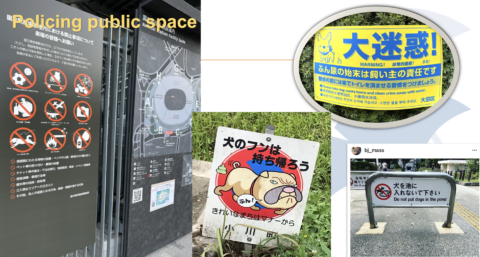
For almost three years, anti-Covid measures in Japan have told people to engage in physical distancing and “self-restraint”. During this time pets as “substitute” family members have gained added interest in order to fill the void in human-human interaction. In this presentation, DIJ deputy director Barbara Holthus will focus on the accelerated interest in pets and accompanying normative changes regarding pet ownership within Japanese society. Through interviews with pet owners and shelter organizations, as well as participant observation in pet shops, pet cafes, and at adoption fairs this presentation will highlight the changing role of pets in Japanese society and the particular role of the pandemic. Barbara’s talk “Pets in Pandemic Japan” is hosted by the University of Tokyo’s Center for Contemporary Japanese Studies and takes place online on Thursday, January 19, 9-10 am JST. Registration here
Martin Hemmert discusses non-internationalization of East Asian start-ups at DIJ online talk
 Western-based research on international new ventures suggests that start-ups are able to internationalize more easily than other types of firms, particularly in globally connected technology-intensive industries. This study of 40 IT start-ups in China, Korea, and Japan reveals that most of these firms do not internationalize successfully. It identifies a variety of factors that deter East Asian start-ups from internationalizing, including large domestic markets, general resource and capability shortages, insufficient international market knowledge, international adaptation costs, and non-supportive home and host country policies. Findings suggest that start-ups in East Asia may not necessarily face lower internationalization barriers than established firms. Details and registration here
Western-based research on international new ventures suggests that start-ups are able to internationalize more easily than other types of firms, particularly in globally connected technology-intensive industries. This study of 40 IT start-ups in China, Korea, and Japan reveals that most of these firms do not internationalize successfully. It identifies a variety of factors that deter East Asian start-ups from internationalizing, including large domestic markets, general resource and capability shortages, insufficient international market knowledge, international adaptation costs, and non-supportive home and host country policies. Findings suggest that start-ups in East Asia may not necessarily face lower internationalization barriers than established firms. Details and registration here
Martin Hemmert, Korea University/DIJ Tokyo
Japan-Stipendien für Promovierende
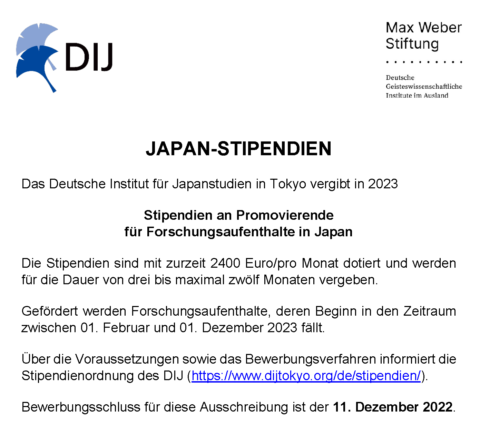 Für das Jahr 2023 vergibt das DIJ wieder attraktive Stipendien zur Förderung von Forschungsaufenthalten in Japan im Rahmen von Promotionsvorhaben. Die Stipendien sind mit zurzeit 2400 Euro/Monat dotiert und werden für die Dauer von drei bis maximal zwölf Monaten vergeben. Gefördert werden Forschungsaufenthalte, deren Beginn in den Zeitraum zwischen 1. Februar und 1. Dezember 2023 fällt. Über die Voraussetzungen sowie das Bewerbungsverfahren informiert unsere Stipendienordnung. Bewerbungsschluss für diese Ausschreibung ist der 11. Dezember 2022.
Für das Jahr 2023 vergibt das DIJ wieder attraktive Stipendien zur Förderung von Forschungsaufenthalten in Japan im Rahmen von Promotionsvorhaben. Die Stipendien sind mit zurzeit 2400 Euro/Monat dotiert und werden für die Dauer von drei bis maximal zwölf Monaten vergeben. Gefördert werden Forschungsaufenthalte, deren Beginn in den Zeitraum zwischen 1. Februar und 1. Dezember 2023 fällt. Über die Voraussetzungen sowie das Bewerbungsverfahren informiert unsere Stipendienordnung. Bewerbungsschluss für diese Ausschreibung ist der 11. Dezember 2022.
Online workshop on Abe’s Legacy for the Future of Japanese-Southeast Asian Relations

The assassination of former Japanese Prime Minister Shinzo Abe on 8 July 2022 stunned the world. As Japan’s longest serving prime minister (2006–07; 2012–20), Abe shaped the country’s politics like few of his predecessors. His political legacy is most visible in the arena of international politics. Abe introduced the idea of an Indo-Pacific region into geopolitical discourse and envisioned a foreign policy based on the rule of law, human rights, and democracy. Southeast Asia is the heart of this region. But the region’s countries also are diverse in terms of economic development, political regimes, and geopolitical positioning. This online workshop will explore the legacy of the Abe government from the perspective of Southeast Asian countries through case studies of their bilateral relations with Japan, including Indonesia (Bima Prawira Utama), the Philippines (Karl Ian Cheng Chua), Singapore (Kei Koga), Thailand (David M. Malitz), and Vietnam (Hoang Minh Hang). Details and registration here
DIJ Study Group with Giulia De Togni on ‘Caring Machines’
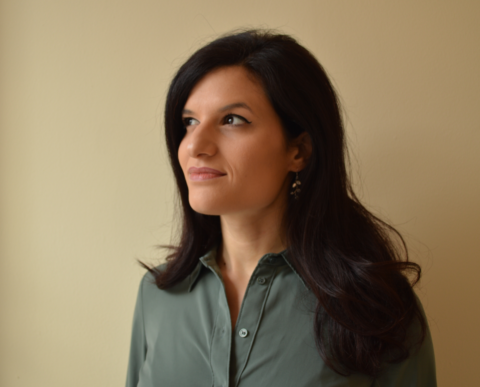 Robotics is a growing field in the delivery of care. “Socially Assistive Robots” (SARs) have the potential to ‘care’ for humans through social interaction, physical assistance, and therapy delivery. However, the emergence of ‘caring machines’ raises ethical, social, and technological questions. Giulia De Togni’s research aims to understand in what ways our identities and care relationships may be affected by the use of SARs and how this may vary in different cultural contexts. Her study is based on interviews with those who are developing robots, health and social care practitioners, and those receiving care; observations in robotics laboratories and care facilities in the UK and Japan – two rapidly ageing, highly industrialized countries which are leading in AI and robotics innovation. Details and registration here
Robotics is a growing field in the delivery of care. “Socially Assistive Robots” (SARs) have the potential to ‘care’ for humans through social interaction, physical assistance, and therapy delivery. However, the emergence of ‘caring machines’ raises ethical, social, and technological questions. Giulia De Togni’s research aims to understand in what ways our identities and care relationships may be affected by the use of SARs and how this may vary in different cultural contexts. Her study is based on interviews with those who are developing robots, health and social care practitioners, and those receiving care; observations in robotics laboratories and care facilities in the UK and Japan – two rapidly ageing, highly industrialized countries which are leading in AI and robotics innovation. Details and registration here
Giulia De Togni, The University of Edinburgh Medical School
Hybrid lecture by Barbara Holthus on pets in contemporary Japan
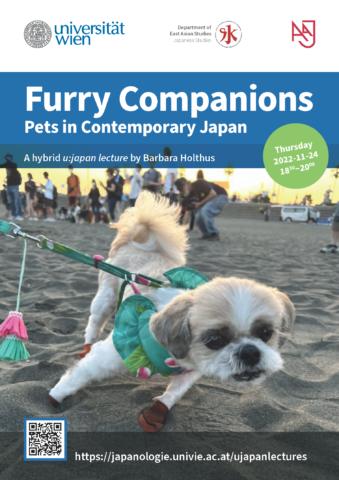
The accelerated interest in pets in Japan has not started with the pandemic but certainly has been intensified by it. In response to more than two years of physical distancing and “self-restraint”, many Japanese have turned to pets as “substitute” family members that helped to fill the void in human-human interaction. The growing popularity of pets in Japan, together with the accompanying normative, social, and legal changes regarding pet ownership within Japanese society are the focus of the presentation Furry Companions: Pets in Contemporary Japan by DIJ sociologist Barbara Holthus. Drawing on data from interviews, participant observation, publications by the Ministry of the Environment, the National Police Agency, and media, Barbara’s presentation will highlight the embeddedness and changing role of pets in Japanese society. Registration for this hybrid event on November 24 at the University of Vienna and online here
Barbara Holthus to deliver keynote lecture at AJJ 2022 conference
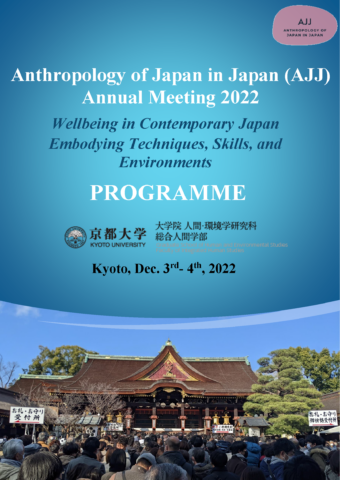
DIJ deputy director Barbara Holthus and Wolfram Manzenreiter (University of Vienna) will deliver the keynote lecture at the Anthropology of Japan in Japan (AJJ) Annual Meeting at Kyoto University on December 3, 2022. Their presentation “The Social DNA of Happiness: Looking back, looking ahead” will outline the main research foci and results in a field that has become increasingly informed by findings from genetics, sociology, and anthropology. It will also introduce findings from their own studies in the field of happiness and well-being in Japan, including the relationality of well-being and happiness in rural Japan; life satisfaction among parents with young children and in social-movements; a new research tool to illustrate the multidimensionality of well-being in interviews. Looking ahead, their presentation will address the need for more anthropological engagement in this world of permanent flux, instability, threatened democracies, climate crisis, and the Covid-19 pandemic.





 Open Access
Open Access
